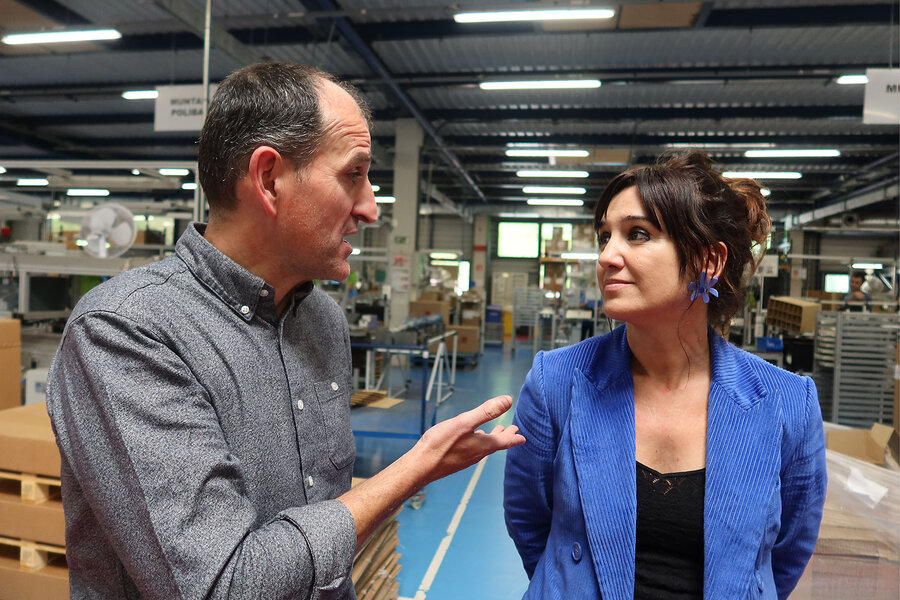
Photo: Erika Page/Christian Science Monitor.
Amaia Salbide speaks with plant manager Ander Jausoro on the factory floor of an industrial plant belonging to Copreci, one of the Spanish companies sharing ownership with workers. “No one is rich. No one is poor.”
Giving workers a piece of the responsibility for a company’s success — and a piece of the profits — is not a new idea. But lately it’s been gaining traction in Spain.
Erika Page reports at the Christian Science Monitor, “At first glance, this could be any industrial factory. Workers wearing protective gloves assemble control panels and heating plates amid the relentless whirring of machinery. Giant yellow robot arms swing back and forth, lining trays with tiny metal parts.
“But there is a reason that each year thousands of visitors from every continent come to this mountainous Basque landscape to study factories like this one. This is the home of the Mondragon Corp., the world’s largest federation of worker-owned cooperatives.
“Copreci, which makes parts for home appliances, is one of 81 Mondragon cooperatives, ranging from manufacturing to finance and retail. By the end of the day, this floor alone will churn out 30,000 gas valves, destined for stoves worldwide.
“Yet it is also churning out a radically different vision of capitalism. For young people especially, capitalism brings to mind wealth inequality, cost-of-living crises, and environmental collapse. …
“The Mondragon Corp. sees itself as a third way, not as an alternative to capitalism, but as an alternative way of doing capitalism – one that can build trust, not widen divisions.
“ ‘The purpose of what we’re doing here is not the machinery or the production process,’ says Amaia Salbide, president of Copreci, on a visit to the factory floor. ‘Those are tools to reach a higher goal of social transformation.’ …
“Mondragon’s nearly 70,000 members, ranging from floor workers to top executives, are co-owners of their businesses. They have voting power at general assemblies, where they weigh in on company strategy and policy. The income disparity between the highest- and lowest-paid employees in Mondragon’s cooperatives is capped at a ratio of 6-to-1, compared with a typical ratio of 344-to-1 in the United States. …
“As the saying around here goes, Mondragon does not create rich people, but rich societies. That means prioritizing quality of life for the employees who live and work in the towns dotting these forested hills rather than maximizing profit for investors.
“ ‘I think of it as a sort of attractive form of capitalism,’ says Nick Romeo, author of The Alternative: How To Build a Just Economy. ‘One that works more effectively for more people but retains some of the benefits of markets and efficiency and competition.’
“Hugo Montalvo knows he could make more money as a sales manager at a regular multinational company. But he wouldn’t trade his middle-class status or the small town where he is raising his two children. At the end of a day’s work, Mr. Montalvo often finds those on the assembly line picking up their children from the same schools as top managers and gathering at the same tables at local bars. The base pay for a Mondragon worker is on average 40% higher than Spain’s minimum wage.
“ ‘Here, no one is rich,’ says Mr. Montalvo, who works for Ecenarro, a Mondragon cooperative. … ‘But no one is poor either. We’re all in that middle range, earning decent salaries.’
“Solidarity permeates the business model. To become a member of a cooperative, a worker invests €17,000 ($18,400), normally bit by bit over time. As for company profit, 60% is reinvested in the business, 30% goes to employees as capital, and 10% is for the local community. At the end of each year, Mondragon reviews each cooperative’s earnings, and companies in better financial positions contribute to those that are struggling.
“ ‘Just as we’ve received in the past, now it’s our turn to give,’ says Mr. Montalvo.
“Back in 2013, he was working for Fagor Electrodoméstico, a Mondragon cooperative that at the time was Spain’s leading home appliance company. When the company went bankrupt in the aftermath of the financial crisis, his job and initial investment disappeared.
“Within two weeks, he was transferred to Ecenarro, and Mondragon covered his membership fee. Of the almost 2,000 people who lost their jobs at Fagor, 95% were relocated within the Mondragon network. During the pandemic, workers came to collective agreements to avoid job losses, including salary reductions. …
“ ‘The cooperative is a creator of wellness, so it has to exist for decades and decades,’ says Ander Etxeberria, who leads Mondragon’s cooperative outreach program.”
As with anything, there are challenges here, too. Get more details at the Monitor, here.
